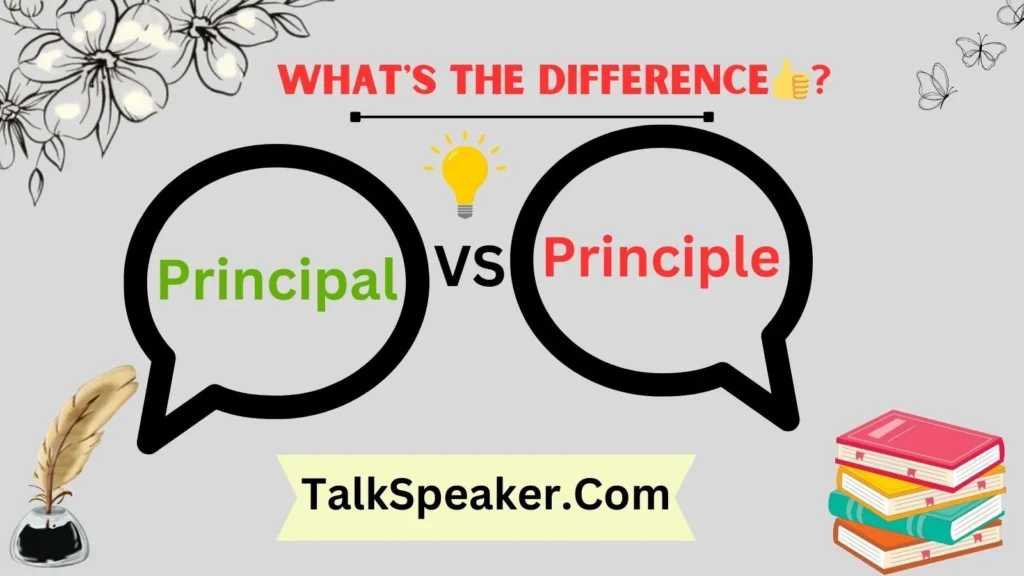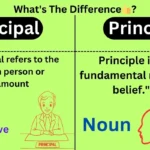The words “principal” and “principle” are often confused, but understanding their meanings and applications in different contexts can greatly improve both your writing and communication skills.
Whether you’re working on school assignments, handling finances, or simply trying to get the right word in a conversation.
Principal refers to the main person or amount, while Principle is a fundamental rule or belief.”
This comprehensive guide will clear up the confusion and help you use these words correctly.
What is the Difference Between Principal and Principle?

Before diving into the various contexts in which these words are used, let’s start with a solid understanding of their definitions.
Principal: Definition and Meaning
The term principal can function as both a noun and an adjective, and it refers to something that is primary or most important in a given situation.
- As a noun, it usually denotes a person or thing that holds the primary position in a hierarchy or a transaction.
- As an adjective, it refers to something that is the main or chief in importance.
Examples of “Principal” in Use:
- Principal as a noun: “The principal of the school is addressing the students.” Here, the word refers to the person in charge of the school.
- Principal as an adjective: “The principal issue in this case is the mismanagement of funds.”
Principle: Definition and Meaning
On the other hand, principle is always a noun, and it refers to a fundamental truth, law, or belief that serves as a foundation for actions, decisions, or systems.
Principles are often thought of as guiding rules or moral beliefs.
Examples of “Principle” in Use:
- “She has strong ethical principles that guide her decisions.”
- “The principles of physics are essential in understanding how the world works.”
So, while principal is often about something or someone of primary importance, principle refers to a core truth or standard.
Principal vs Principle: A Clear Comparison

| Term | Definition | Example |
|---|---|---|
| Principal | Refers to the primary person, thing, or amount. | – The principal of the school is responsible for all decisions. – The principal of the loan is $5,000. |
| Principle | Refers to a fundamental truth, rule, or belief. | – He follows the principle of honesty in all his dealings. – The principles of physics govern how objects move. |
Principal Or Principle in Different Contexts
Principal in Finance
In finance, the word principal is most commonly used to refer to the initial amount of money invested or loaned, not including the interest or any other additional fees.
This is a critical distinction for anyone dealing with financial matters like loans, mortgages, or investments.
Examples in Finance:
- “The principal of your loan is $10,000, but you will owe more due to the interest accrued over time.”
- “When you make payments on your mortgage, part of the payment goes towards reducing the principal.”
In this context, principal is crucial because it defines the amount that will be paid off first before interest.
Principle in Finance
While principal deals with the amount of money involved, principle rarely appears in financial contexts.
However, it can refer to the ethical standards or financial rules that govern the industry.
For example, the principles of sound investment include diversification and long-term planning.
Principal vs Principle in School
In education, the term principal is used to refer to the head or leader of a school.

The principal is responsible for overseeing the daily operations of the school, including staff management and student welfare.
Example in School:
- “The principal called an emergency meeting for the staff to discuss the new policies.”
Principle, in an educational context, refers to the core ideas or rules that guide teaching methods and learning.
For example, the principles of effective teaching might include student engagement and critical thinking.
Example in Education:
- “The principles of inclusive education focus on providing equal opportunities for all students.”
Principal in Other Fields: Law and Authority
Outside of finance and education, principal can refer to individuals in positions of authority or leadership.
For example, in law, the principal might refer to the person who is directly responsible for a criminal act, or the principal party in a contract.
- “The principal in a criminal case is the individual who carried out the illegal act.”
- “The principal in the contract is the primary party responsible for the agreement.”
In the context of business, a principal could also refer to a business partner or the main investor in a company.
In politics or governance, the term may also refer to someone holding a position of great authority, such as a principal secretary.
Principle in Philosophy and Ethics
When discussing ethics, principle plays a significant role. It can refer to a moral law or a standard of behavior that guides actions.
Principles in ethics are usually non-negotiable rules that align with an individual’s values or the philosophy of a society.
Examples in Ethics:
- “The principle of honesty dictates that we should always tell the truth.”
- “One of the principles of democracy is that all citizens have the right to vote.”
How to Remember Principal vs. Principle
For many, distinguishing between principal and principle can be tricky.
Here are some simple tips to help you keep them straight:
- Principal has an “a” – think of the “a” as standing for “administrator” or “authority.” It’s the person in charge, such as the principal of a school or a principal amount of money in finance.
- Principle has an “i” – remember that principle refers to a rule or belief. Think of it as a guiding idea or law.
Tip: If you’re unsure, ask yourself:
- Principal: Is it about the main person or thing?
- Principle: Does it refer to a fundamental belief or rule?
Plural Form: Principals vs Principles
While principals and principles are both plural forms, they are used differently.
- Principals refers to multiple main individuals or leaders.
- Example: “The principals of various schools attended the conference.”
- Principles refers to multiple rules or standards.
- Example: “The company’s principles include honesty, transparency, and respect.”
ng.
Frequently Asked Questions (FAQs)
What is the Difference Between ‘Principal’ and ‘Principle’ in Economics?
In economics, principal refers to the initial amount invested or loaned, while principle refers to the rules or laws that govern economic systems or behavior.
For example, the principal amount of a loan is the amount you originally borrowed, while the principles of economics include concepts like supply and demand or market equilibrium.
What Does ‘Principal’ Mean in Business?
In business, principal typically refers to a key figure—such as a business partner, main investor, or company leader.
For example, a principal in a law firm is the senior partner or the owner of the firm.
What is the Difference Between ‘Principle’ and ‘Value’?
While both terms refer to guiding beliefs, principles are broader rules or truths, whereas values are personal beliefs that dictate one’s actions or decisions.
Principles are often universal, while values are subjective and can vary from person to person.
Conclusion
Understanding the difference between principal and principle is essential for clear communication. Whether you’re writing a letter to your school’s principal, discussing the principles of science, or managing financial transactions, getting these words right will make you sound more professional and precise.
Keep the tips provided in mind, and you’ll be able to confidently distinguish between the two in any context.
By mastering these distinctions, you’ll avoid common grammar mistakes, improve your writing, and ensure that your message is always clear and effective.

Amelia Harris, a passionate educator, simplifies English grammar and vocabulary for learners of all levels. With her engaging style, mastering English has never been easie




